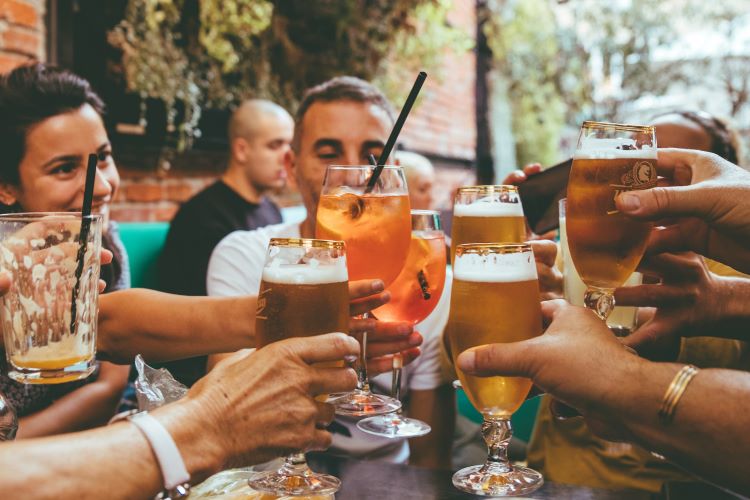There are huge repercussions for people who live with an addiction. Sadly, what many don’t realise is that substance misuse problems are usually the issue of a coping mechanism gone wrong.
Nobody starts life thinking that they want to become addicted to drugs or alcohol. This doesn’t change. Life happens, though, and with it comes haunting and horrific events, for others, emotional stress, or perhaps time spent in places with people where drugs and alcohol are normalised as a habit.
In some instances, addiction may happen very quickly, in others it can take time. Either way, a person can come to rely on substances to get through the day. Remove that substance and this is also an incredibly stressful experience for many who don’t know where else to turn for support.
It takes great inner strength to accept that the habit of a long while isn’t serving you. This is especially the case where people might attach sought-after effects to psychoactive substances.
Speaking with someone who understands substances and the nature of addiction and who has useful information on local rehab options in Monmouthshire is highly beneficial. Call OK Rehab on 0800 326 5559 for a discussion about these issues.
The Best Rehabilitation Programmes In Monmouthshire

The OK Rehab team is connected to rehabilitation clinics in Monmouthshire and the surrounding regions. It’s our goal to ensure people we support have access to top-quality treatments. This is for people to have the highest chances of a successful recovery.
The rehab clinics we refer to have brilliant staff who have years of experience and up-to-date training on how to support and treat people with addictions. The clinical setting is designed to be both welcoming and professional.
It’s essential that residents and outpatients feel comfortable and so the ambience of clinics facilitate this. Treatments are the best in the field with clinics ensuring that they’re following the most current methods of recovery support.
With all these aspects considered, you achieve the best outcomes in terms of recovery.
Who Is Most Likely To Develop An Addiction?

Addiction is a disease and it doesn’t opt for a particular person from a certain segment of society. There are, however, factors that can increase a person’s likelihood of developing a drug or alcohol problem. When more than one of these factors exists the chances are even higher.
Factors that increase the likelihood of addiction include:
- A genetic predisposition. Some people are neurologically more likely due to the structure and makeup of their brains.
- Childhood background. People who have grown up around others who have lived with addiction are at an increased risk.
- People with low-self esteem.
- Those who have experienced trauma.
- People who have been discriminated against and who are marginalised.
- Spending time with people who use substances regularly.
What Happens In The Brain When A Person Takes A Psychoactive Substance?

The clue is in the word, “psychoactive”. These types of substances directly impact the functioning of the brain by triggering chemical responses.
The chemicals released when a person uses drugs or alcohol produce feelings of relaxation, confidence, energy, euphoria, and pain reduction.
At the experimental stage of substance use, a person will be positively reinforced by their taking the substance because it will “reward” them with good feelings. This is why many people return to the substance.
It’s easy to understand, therefore, why some people who are experiencing stressful, distressing, or painful events might return to drugs or alcohol to try and make themselves feel better. It’s also one of the reasons why people with mental health problems are susceptible to addiction.
When people use substances to try and regulate their feelings, it’s known as self-medication.
How Do You Know If Your Substance Use Has Turned Into An Addiction?

There are different stages that you will hit as you walk along the path of substance use. People begin by trying drugs and alcohol, others might go on to use them recreationally when out with friends a few times a year. There’s a very blurred line between recreational use and problematic.
Problematic drug and alcohol use is where negative effects connected to substance use begin to emerge. These might include poor performance at school, college, or work, taking days off, problems sleeping, and low motivation.
When addiction develops there are clear signs to look out for such as:
- Loss of interest in usual activities.
- Not prioritising responsibilities
- Problems with sleep.
- Not eating properly (including not eating and binge eating).
- Weight loss or gain.
- Mood swings.
- Money problems.
- Arguments with people around you.
- Thinking about the substance regularly.
- Wanting the substance regularly and feeling stressed if you don’t know how to get it.
It’s important to keep in mind that some people are termed “functioning alcohol and drug users”. This is when people can maintain the life they always had, keeping up with responsibilities while being reliant on a substance to function “normally”.
Is Treatment Essential?

Whether a person is dependent, addicted, has problematic use, or uses occasionally, they must know the effects of the substances they’re putting into their body.
For people experimenting and using recreationally, making informed decisions about what you ingest is critical. The majority of people are aware of the food and drink they’re taking in and the exercise they do, so it makes sense to be th e same with drugs and alcohol.
For people who are living with moderate to severe drug and alcohol issues, it’s incredibly important to access rehabilitation treatments.
Substances are highly toxic and have seriously damaging effects on the mind and body. People who use regularly are inevitably going to reach a point where their health and well-being are negatively impacted.
The sooner treatment is accessed and a person can look after their body through food, healthy drinks, and exercise, the better and more positive future they’ll have.
It’s possible to turn your life around with the best rehabilitation support. To find out what this is in Monmouthshire, call OK Rehab on 0800 326 5559.





